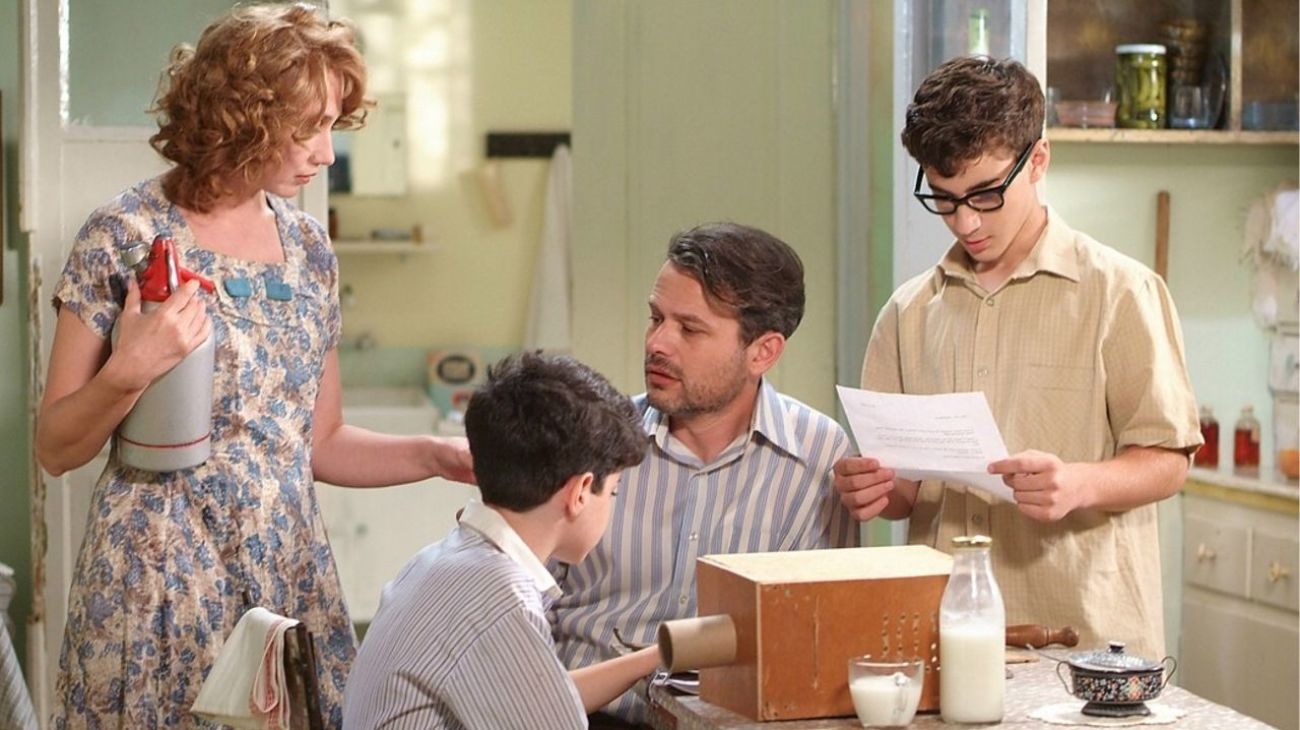
Israeli Cinema Day II
I really did think I had Dear Mr. Waldman pegged early on. A flashback to a little boy who falls in love with American movies, and loses sight of his own culture as a result? And he has a torturous relationship with his parents? And it was co-produced by notorious Yoram Globus, late of Cannon Films? This had all the makings of an Israeli Cinema Paradiso, I thought to myself.
Not to put too fine a point on it, I was wildly, humiliatingly wrong. There's barely even a hint of nostalgia or sentimentality in Dear Mr. Waldman (most of it during the unfortunately tidy ending). In its place, there is a rather intense look at how the wounds of the Holocaust never quite heal, and how one father came within a hair's breadth of losing his mind and his family because of what he suffered.
So no, not Cinema Paradiso.
The film is told from the perspective of Hilik Waldman (Ido Port), a boy around 10 years of age in Tel Aviv, 1962. His father, Moishe (Rami Heuberger) is a colorful but slightly erratic sort of character - we are introduced to him as he enthusiastically tells his wife Rivka (Jenya Dodina) how his one-man letter writing campaign is going to result in a new bus stop near their home. Why? Because he, Moishe Waldman, demands it.
Moishe is clearly fragile, and he breaks when President Kennedy announces his new advisor, Jack Waldman. Moishe becomes convinced that this man is his long-lost son Yanek, who was supposedly killed by the Nazis in Auschwitz, and he pursues this absurd fantasy to ends where he eventually abandons his family. Meanwhile, Hilik muddles through his young life without any guidance, trying to do what he can to please a father increasingly obsessed with a dead son, and slowly, accidentally discovering romance.
This could have been a simple little family story, about generations growing up and the bonds between fathers and sons, et cetera. Instead, it's genuinely harrowing in spots, and its subject is not so much how families stick together as how they are torn apart, and how no amount of superficial healing - in this case, the establishment of Israel and its subsequent economic flowering - can fix truly anguishing traumas - in this case, losing the two people most important in one's life to the German death camps. Not that post-Holocaust stories are ever particularly cheerful, but Dear Mr. Waldman seems exceptionally dour, suggesting not only that recovering from that event takes a long time, it can never happen at all - the best a survivor can do is force himself to keep living and try to minimize the degree to which he flakes out.
Screenwriter Hanan Peled makes his directorial debut with this project, and his filmmaking style is probably best called "functional." By which I mean to say, the story is compelling, but it's not served very well by the movie it's couched inside. Peled doesn't have very much natural skill with a camera, and most of the scenes unfold in extremely bland medium shot-reverse shot set-ups. It's not terribly interesting, and only effective in the most literal possible sense of "point the camera at what is happening", and the effect is that the brief 84 minutes of the film don't exactly skip by. It's somewhat a letdown, that a story like this should end up looking so prosaic, televisionesque one might say. I suppose the one thing Peled should be credited with is not actively distracting us from the screenplay.
Actually, two things: he also manages to get a truly magnificent performance out of young Ido Port, who gives one of the most natural performances I've seen by any child actor in at least a few years. It is to be admitted that child actors' performances are usually judged by how little they do wrong, so the competition isn't exactly stiff. Nevertheless, Port holds his own against two unforgiving lead performances, especially Heuberger, a bundle of tics and neuroses that's a liability to the film almost as much as it is uncomfortably effective; somehow, without doing much else than furrowing his brow with worry, Port manages to wrest each and every scene away from the older actor's frequent scenery chewing.
It is a character-driven piece when all is said and done, and as such it lives and dies with the actors. Fortunately, it tends to succeed on those grounds. With less convincing figures at the center, the story would have come across as banal rather than sorrowful. And sorrowful it is indeed; far more sorrowful than the plot would seem to suggest, wresting away a touch of bittersweet loss even in its apparently triumphant finale (thanks to a casual throwaway line, no less). It's a true pity that it's so slack as a cinematic work; this could have been a terrifically important commentary on Israeli identify instead of just a mostly appealing character drama.
7/10
Not to put too fine a point on it, I was wildly, humiliatingly wrong. There's barely even a hint of nostalgia or sentimentality in Dear Mr. Waldman (most of it during the unfortunately tidy ending). In its place, there is a rather intense look at how the wounds of the Holocaust never quite heal, and how one father came within a hair's breadth of losing his mind and his family because of what he suffered.
So no, not Cinema Paradiso.
The film is told from the perspective of Hilik Waldman (Ido Port), a boy around 10 years of age in Tel Aviv, 1962. His father, Moishe (Rami Heuberger) is a colorful but slightly erratic sort of character - we are introduced to him as he enthusiastically tells his wife Rivka (Jenya Dodina) how his one-man letter writing campaign is going to result in a new bus stop near their home. Why? Because he, Moishe Waldman, demands it.
Moishe is clearly fragile, and he breaks when President Kennedy announces his new advisor, Jack Waldman. Moishe becomes convinced that this man is his long-lost son Yanek, who was supposedly killed by the Nazis in Auschwitz, and he pursues this absurd fantasy to ends where he eventually abandons his family. Meanwhile, Hilik muddles through his young life without any guidance, trying to do what he can to please a father increasingly obsessed with a dead son, and slowly, accidentally discovering romance.
This could have been a simple little family story, about generations growing up and the bonds between fathers and sons, et cetera. Instead, it's genuinely harrowing in spots, and its subject is not so much how families stick together as how they are torn apart, and how no amount of superficial healing - in this case, the establishment of Israel and its subsequent economic flowering - can fix truly anguishing traumas - in this case, losing the two people most important in one's life to the German death camps. Not that post-Holocaust stories are ever particularly cheerful, but Dear Mr. Waldman seems exceptionally dour, suggesting not only that recovering from that event takes a long time, it can never happen at all - the best a survivor can do is force himself to keep living and try to minimize the degree to which he flakes out.
Screenwriter Hanan Peled makes his directorial debut with this project, and his filmmaking style is probably best called "functional." By which I mean to say, the story is compelling, but it's not served very well by the movie it's couched inside. Peled doesn't have very much natural skill with a camera, and most of the scenes unfold in extremely bland medium shot-reverse shot set-ups. It's not terribly interesting, and only effective in the most literal possible sense of "point the camera at what is happening", and the effect is that the brief 84 minutes of the film don't exactly skip by. It's somewhat a letdown, that a story like this should end up looking so prosaic, televisionesque one might say. I suppose the one thing Peled should be credited with is not actively distracting us from the screenplay.
Actually, two things: he also manages to get a truly magnificent performance out of young Ido Port, who gives one of the most natural performances I've seen by any child actor in at least a few years. It is to be admitted that child actors' performances are usually judged by how little they do wrong, so the competition isn't exactly stiff. Nevertheless, Port holds his own against two unforgiving lead performances, especially Heuberger, a bundle of tics and neuroses that's a liability to the film almost as much as it is uncomfortably effective; somehow, without doing much else than furrowing his brow with worry, Port manages to wrest each and every scene away from the older actor's frequent scenery chewing.
It is a character-driven piece when all is said and done, and as such it lives and dies with the actors. Fortunately, it tends to succeed on those grounds. With less convincing figures at the center, the story would have come across as banal rather than sorrowful. And sorrowful it is indeed; far more sorrowful than the plot would seem to suggest, wresting away a touch of bittersweet loss even in its apparently triumphant finale (thanks to a casual throwaway line, no less). It's a true pity that it's so slack as a cinematic work; this could have been a terrifically important commentary on Israeli identify instead of just a mostly appealing character drama.
7/10






